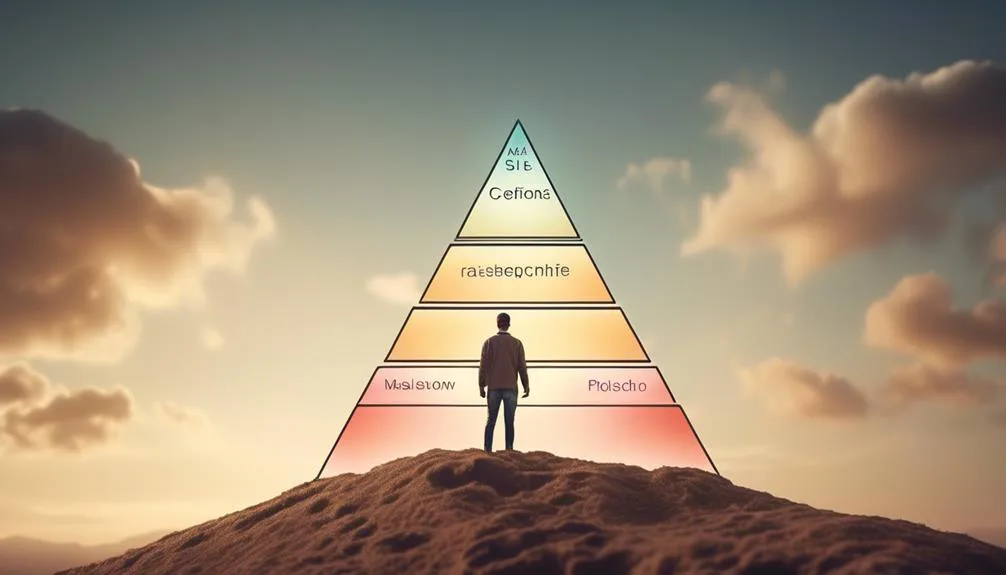Do you ever find yourself wondering what it takes to truly embrace your worth and build a strong sense of self-esteem?
Well, it just so happens that a psychologist has uncovered the key to unlocking this elusive quality. This revelation could be the missing piece in your journey towards self-acceptance and personal growth.
By understanding the intricacies of self-esteem and its profound impact on your life, you will be equipped with the tools necessary to navigate the challenges that come your way.
So, are you ready to embark on a transformative journey of self-discovery? Hold on tight, because the secrets to cultivating a positive self-image are about to be unveiled.
Key Takeaways
- Self-esteem is a measure of a person's overall sense of value or worth.
- Self-esteem is influenced by factors such as genetics, personality, life experiences, age, health, thoughts, social circumstances, and the reactions of others.
- Self-esteem is different from self-acceptance and should be considered in the context of overall well-being and success.
- Self-esteem is a component of Maslow's esteem needs, but the esteem of others is believed to be more important for development and need fulfillment.
Understanding Self-Esteem in Psychology
Understanding self-esteem in psychology involves examining the factors that influence a person's overall sense of value and worth. Self-esteem development is a complex process influenced by various factors, such as genetics, personality, life experiences, age, health, thoughts, social circumstances, and the reactions of others.
It's important to measure self-esteem accurately to gain insights into an individual's self-perception and well-being. Psychologists continue to study how self-esteem develops and what influences it, seeking to understand the intricacies of this psychological construct. Self-esteem measurement tools, such as questionnaires and self-report scales, are utilized to assess an individual's level of self-esteem.
These measurements help psychologists gain a better understanding of how self-esteem impacts various aspects of life, such as relationships, achievement, and overall mental health. By comprehending the development and measurement of self-esteem, we can enhance our understanding of human behavior and well-being.
Factors Influencing Self-Esteem

To further explore the factors that shape your self-esteem, it's crucial to examine the various influences that contribute to your sense of value and self-worth. Two important factors that play a significant role in shaping self-esteem are genetics and social circumstances.
Genetics can have an impact on your self-esteem. Research suggests that certain genetic factors may contribute to the development of self-esteem. These genetic factors can influence aspects such as temperament, personality traits, and emotional stability, which in turn can affect how you perceive yourself and your level of self-worth.
Social circumstances also play a crucial role in shaping self-esteem. The environment you grow up in, the relationships you have, and the cultural norms and values you're exposed to can all have a significant impact on your self-esteem. Positive social interactions, support from loved ones, and a sense of belonging can contribute to higher self-esteem, while negative social experiences, such as bullying or rejection, can lower it.
Understanding the role of genetics and social circumstances in shaping self-esteem can help you develop a deeper understanding of yourself and the factors that influence your sense of value and self-worth. By recognizing these influences, you can work towards building a healthier and more positive self-esteem.
Differentiating Self-Esteem From Other Concepts

Self-esteem can be differentiated from other concepts by understanding its distinct focus on an individual's attitude and evaluation of themselves, rather than just their perception or worth. To better grasp this distinction, it's essential to explore self-esteem in relation to self-compassion and examine its role in personal relationships.
- Exploring self-esteem in relation to self-compassion: Self-esteem involves how we think and feel about ourselves, while self-compassion centers on how we relate to and treat ourselves. Self-compassion fosters a healthy sense of self-esteem by promoting self-acceptance, kindness, and understanding.
- Examining the role of self-esteem in personal relationships: Self-esteem plays a crucial role in personal relationships. When individuals have a positive self-view, they're more likely to engage in healthy and fulfilling relationships. Conversely, low self-esteem can lead to difficulties in forming and maintaining meaningful connections.
Understanding these distinctions and exploring the relationship between self-esteem, self-compassion, and personal relationships can provide valuable insights into fostering a healthy sense of self-worth and building fulfilling connections with others.
Self-Esteem in Maslow's Hierarchy of Needs

In Maslow's Hierarchy of Needs, self-esteem is an essential component of esteem needs, encompassing respect, recognition, and accomplishment. According to Maslow, self-esteem is crucial for personal growth and self-actualization. It involves feeling valued and respected by others, as well as having a positive self-perception.
However, there are criticisms of Maslow's hierarchy that question the importance of external validation for self-esteem. Some argue that relying too much on the esteem of others can lead to an unhealthy dependence on external validation. Additionally, it's important to recognize that self-esteem shouldn't solely depend on the opinions and judgments of others.
Instead, it should also come from within, based on our own accomplishments and personal values. Striking a balance between internal and external sources of self-esteem is key to maintaining a healthy sense of self-worth.
Incorporating Self-Esteem in Positive Psychology

Building upon our understanding of the importance of self-esteem in Maslow's Hierarchy of Needs, let's now explore how self-esteem can be incorporated in the field of positive psychology.
Incorporating self-esteem in positive psychology involves recognizing its role in mental health and understanding its impact on relationships. Here are three ways self-esteem can be integrated into the field:
- Enhancing mental well-being: Self-esteem plays a crucial role in mental health, as it affects how individuals perceive and value themselves. Positive psychology can focus on strategies that promote self-acceptance, self-compassion, and self-love, ultimately improving overall well-being.
- Building healthy relationships: Self-esteem significantly influences relationships, as individuals with low self-esteem may struggle with trust, assertiveness, and setting boundaries. Positive psychology can emphasize the importance of healthy self-esteem in fostering positive connections and building strong and fulfilling relationships.
- Cultivating resilience: Self-esteem acts as a protective factor against adversity and stress. Positive psychology can incorporate interventions that strengthen self-esteem, enabling individuals to cope effectively with challenges and bounce back from setbacks.
Frequently Asked Questions
How Can Genetics Influence a Person's Self-Esteem?
Genetic factors play a role in shaping your self-esteem. The nature vs. nurture debate suggests that certain genes may influence your predisposition to self-esteem, but it's important to remember that other factors, like life experiences, also contribute.
What Role Do Life Experiences Play in Shaping Self-Esteem?
Life experiences, such as your upbringing and any trauma you've faced, play a significant role in shaping your self-esteem. These experiences can impact your beliefs about yourself and influence how you value and perceive your worth.
How Does Age Impact an Individual's Self-Esteem?
As you age, your self-esteem can be influenced by various factors such as media portrayal of aging, societal expectations, and cultural values. These influences can shape your perceptions and attitudes towards yourself, impacting your self-esteem.
How Can Social Circumstances Affect a Person's Self-Esteem?
Social circumstances can have a significant impact on your self-esteem. Peer pressure and cultural expectations can influence how you view yourself, impacting your sense of worth and value. It's important to recognize and challenge these external factors to cultivate a healthy self-esteem.
What Are Some Strategies for Improving Self-Esteem?
To improve your self-esteem, try incorporating positive affirmations and engaging in self-care activities. Remind yourself of your worth and value through affirming statements, and prioritize activities that promote self-care and self-love.
Conclusion
Congratulations! You have now discovered the key to unlocking your self-esteem and embarking on a journey of self-discovery and personal growth.
By understanding the complexities of self-esteem and incorporating the strategies revealed by the psychologist, you can cultivate a healthier self-image and develop a greater sense of self-acceptance.
Remember, your perception of your own value and worth is crucial in navigating through life and interacting with others.
Embrace this newfound knowledge and embark on a path towards a positive and fulfilling life.

